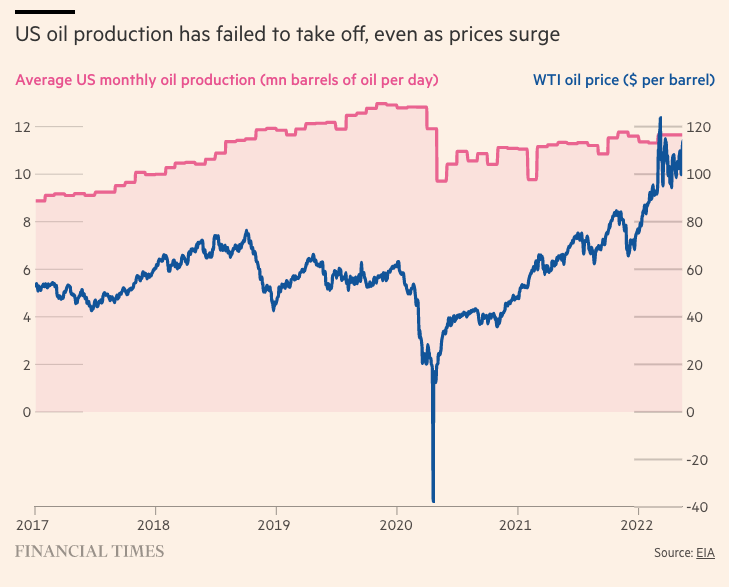Welcome to Episode 62 of The Transcript Podcast
Episode Summary:
In this episode, we cover the strong inflation numbers, the fear that the strong consumer balance sheets might not hold for long, and the impact of declining valuations on employee motivations and retention.
The episode is based on yesterday's newsletter which is available on Substack.
A transcript of this podcast, with relevant images and quotes, is available for subscribers only after the show notes below.
Show Notes
00:00:00 Introduction
00:00:11 Raging Inflation
00:11:53 Nowhere to Make Money
00:03:55 Making More Money Than God
00:06:34 Cross Currents on the Consumer
00:08:57 Impact of Falling Valuations on Employee Retention
00:11:53 Nowhere to Make Money
00:12:44 Advice from Stanley DruckenMiller
00:14:20 Welcome to the Transcript
Episode Transcript
Introduction
[00:00:00] Scott: Hey, everybody. Welcome to a new episode of The Transcript podcast. You've got me Scott Krisiloff, I'm editor of The Transcript, along with Erick Mokaya who's our lead author. We sent out a new issue of the newsletter yesterday.
Raging Inflation
"We currently face macroeconomic challenges, including unacceptable levels of inflation…We're seeing high inflation in almost all of the developed countries around the world" - US Treasury Secretary Janet Yellen
What we saw last week was that even though a couple of weeks ago we started to see signs that inflation may be peaking, last week the CPI numbers, at least psychologically, if nothing else showed that inflation psychology is still very strong and the Federal Reserve is gonna have to be even more aggressive, probably in combating inflation than was initially expected. That's going to be probably pretty heavy for capital markets to be dealing with here for a little bit. But we saw signs of people talking about interest rates that may be much, much higher in order to address inflation. People talking about the Fed's credibility [being] in question. Most noteworthy was that Larry Summers said that the Fed's credibility is coming into question and used some pretty pointed language calling them delusional when they issued their original statements about transitory inflation which, can't say I totally disagree, but Erick, any thoughts on this?
"...once inflation gets above 5% it's never come down unless fed funds have gotten above the CPI well since the cpi is eight that would call for a fed funds rate of above eight frankly -- so if in fact fed funds ever got to eight% which by the way I don't think is going to happen the destruction would be quite material the other" - Duquesne Capital Founder Stanley Druckenmiller
[00:01:07] Mokaya: Yeah. The consensus you can tell is that the Fed is way behind the curve in terms of raising interest rates. And even getting to 3% may not be enough to actually deal with the inflation. So historically looking at what the Green Capital president was saying, and also looking at Stanley Druckenmiller, they were very pointed in what they were saying. Like, Hey Interest rates need to be above 8% to actually deal with inflation. You need to have positive real interest rates to deal with inflation. That was my key takeaway this week. Both of them were speaking at the Sohn conference, which was a very, very insightful conference to listen to, but all in all, I think it's the reality that we are dealing with very high inflation and not just in the US, but also across the world and especially so in Europe. But we're also dealing with a very slowing down global economy. So we may be looking at a situation of stagflation, sadly. But for you though, from being in the US, what's the situation like on the ground in terms of, I know gas prices are way up than normal. What else is up?
[00:02:08] Scott: Yeah I think that what I'm seeing most acutely is the food and energy prices are up a lot. The thing I'm most concerned about right now is just seeing an inflationary psychology starting to take hold. I think the eight and a half percent number to me is still driven a lot by these extreme supply chain challenges and things that have come from COVID. But even if those were to be stripped away, I think our base inflation rate from a psychological perspective is getting into threes, fours, fives, something like that. And then if you are saying that you need positive, real interest rates, which would be my expectation as well, you're talking about, okay, well you need to add at least a point to that, something like that. Let's say 4, 5, and 6% interest rates if not higher, honestly in order to really break something that could be spiraling out of control. When that's the case, equity multiples get down into the low, low double digits, even that, and even the high single digits sometimes into the eights nines, tens, elevens. Equity prices are not ready for that at all.
"It is monetary policy 101 that to defeat inflation, you need positive real interest rates in 1980 Volcker raised rates to 19% to combat 14% inflation. Greenspan raised rates in 1990 to 8.5% to fight 6% inflation. Even burns raised federal funds to 13 in 1974 to fight 11.5% inflation but retreated too quickly to get the job done" - Greenlight Capital President David Einhorn
[00:03:14] Mokaya: 8.6% was already crazy enough to drive the stock market spiraling downwards and year to date you are already significantly down so any more higher readings of inflation would decimate the stock market.
[00:03:32] Scott: Yeah, and I mean, this is something we talked about last week that it's gone beyond just the economic pressure of the actual real inflation. It's become political pressure in the United States, which when it starts bleeding over into elections and the main things that people are caring about in elections, it puts a lot of additional pressure on the Fed. The Fed is not an apolitical body. People think that it is independent. It is certainly not.
Making More Money Than God
"We're going to make sure everyone knows Exxon's profits. Exxon made more money than God last year -- Why aren't they drilling? Because they make more money not producing more oil -- They’re not drilling -- they’re buying back their own stocks & making no new investments. Exxon, start investing, start paying your taxes" - United States President Joe Biden
[00:03:55] Mokaya: A quick one though I know the president cracked this week and also laid into Exxon Mobil. Does that have to do anything with inflation? Is it the high energy prices? What’s up?
[00:04:06] Scott: I mean, it's a little bit crazy. It's like talking outta two sides of your mouth. I don't wanna get too political here probably, but obviously, we've covered very closely that going back a year, two years ago, the reason that oil companies in the United States were not heavily investing is because we thought we were at the end of the era of oil.
And we thought that we're all moving to electric vehicles, there's gonna be diminishing demand for oil going forward. And this is exactly why you and I, a year and a half ago on this podcast talked about oil being potentially one of the best areas of the market to invest in because you had such negative sentiment and we really hadn't found a way to get away from oil. And it just took a geopolitical crisis to create the catalyst for oil prices to move higher and oil stocks to go with it. So we were pretty clear at outlining that catalyst a year and a half ago, actually.
[00:05:00] Mokaya: I think from what I'm reading in the Financial Times today was that even though oil prices are very high, the scaling up for production in the US, especially to do with Shell Oil, has also been lagging a lot. So it's not ramped up as much as people expected. That's where you're having a bit of a challenge in the US. So I'm not so sure why that kind of comment was that Exxon Mobil is making more money than God when Apple should be the one he was talking about that is actually making more money than god.
[00:05:27] Scott: Yeah. It's a generational thing. It's like, Thinking. Oh, what would've been - - what would I have said in 2005. In the 2005 oil era, you would've been incentivizing people to drill more, but especially on the left side of politics we are trying to disincentivize, we're all trying to move to renewable energy. So we've disincentivized oil production. We've actually villainized oil production, which is not a political statement for me, but that's just the way it is. And to expect that they're going to be drilling is totally the opposite of everything that you've said for the last two years.
[00:06:10] Mokaya: And expecting them to ramp up production in the space of like two months of conflict, three or four months of conflict is a bit I mean. They've had long-term plans in terms of diversifying away from fossil fuels. I think this is quite a change of direction and tone. So it may take a while for them to actually - - and I wonder how much they would be able to trust you to tell them to change if two months ago you were telling them to be in the other direction. So I think that's a tough one.
Cross Currents on the Consumer
“I worry about what happens as those balance sheets of the consumer start to move down and if they continue spending at the rate they’re spending, they come back down, either at the end of this year or the beginning of next year to where they were. And so I think. I don’t think we should take a lot of solace in those numbers right now. I think there’s, you’ve got consumers have good strong balance sheets, but they’re coming down. And so I think we need to think about that going forward as well." - PayPal (PYPL) CEO Dan Schulman
But a quick one also, the cracks are emerging in terms of spending and consumer sentiment. Consumer sentiment is sinking. The Visa CFO was saying that that could be self-inflicted, that we are actually pessimistic and that's already driving down our expectations going forward. Also, there was a quote that we had there from PayPal’s CEO that the balance sheets are strong right now, but the way people are spending in a couple of months, it may not hold the same way. I tend to agree with the second sentiment, especially that the consumer balance sheet may not hold this much for long.
[00:07:12] Scott: Yeah. I think that that's right. We still, I would characterize it as cross-currents on the consumer. If anything, I would say the headline on consumer spending is still very strong, but I think people who are looking forward are seeing some signs that again, there's sentiment, that's weakening for the consumer. And then I think that people are seeing that balance sheets could deteriorate pretty quickly, especially as you have inflation. As you have inflation without nominal wage growth, you're having real spending power decline. So even if people had $3,000 in their bank account before the pandemic and now $10,000 in their bank account, if the purchasing power of the $10,000 is down by 30%, you're starting to balance back to the old purchasing power.
[00:07:59] Mokaya: So they just spend more to get to the same level they were before, or at least acquire the same stuff that they had before.
[00:08:04] Scott: Exactly. And then one of the interesting quotes that you pulled out was on luxury housing. That luxury housing demand was looking particularly weak I think if I remember that quote correctly, and I think it's very interesting because actually this year that the luxury consumer has been hit probably harder than anybody because so much of the luxury consumer's balance sheet is in equity markets. And so when you have equity markets and even more at the extreme end, who's been the “winner” in the economy for the last 15 years have been high tech, high growth venture type companies, which have very high valuations that are falling by a lot right now. So you probably have a lot of people who were high-end consumers whose balance sheets are down 70%. Equity is down 70% this year.
The impact of falling valuations on employee retention
"I'd say there's two things. One -- and I do think the most substantial component for us and pretty much everyone I talked to in the software world is this construct that equity values are clearly down pretty much across the board with the reassessment of multiples. And the people live through some tough years in COVID and they're tired and people want to change. And I think the concept that we see a lot of people who have been DocuSigners, the people that have left that have been longer-term DocuSign that I love the culture, I love the place. I just want to change. I'm tired. And it was tough. And there was a lot of hard work in the two years with the big growth, but then it's also difficult to feel like, hey, where the opportunity is not what it felt like it used to be. And so that's probably those conversations. We also had a significant number of people that we added during those two years of the very dramatic COVID growth. And they kind of knew only one DocuSign, which was, quite frankly, achieving the sales success was a heck of a lot easier than it had been previously. And definitely, a lot easier than is now. And for some of those folks, I said, the market is telling me that I can get guaranteed compensation someplace else. And since I'm no longer brand new at DocuSign, I don't have that opportunity. And so from a compensation standpoint, they said, I think I'd be better off trying some place new, particularly a lot of the start-ups, up until at least recently have been saying, we'll guarantee your first year of compensation" - DocuSign (DOCU) CEO Dan Springer
[00:08:57] Mokaya: Speaking of the impact of valuations, there was a quote from the DocuSign CEO about the impact this has had on people's motivation and employee retention and motivation. Motivation is down because people can see obviously that the value of their stock has plummeted and the value of the warrants and options that you gave them is actually not worth as much as before. And secondly, of course, that means people are now actually wondering - - something that he hit upon is that the last two years of growth have taken the company to a level of growth which they had aspired to. Long-term growth was achieved in a short-term period. So that means a lot of the people are like, okay, what more do we have to do here anymore? Because of that people are moving to other jobs, people are rethinking what they want to do. So the kind of incentives that made people come to companies like DocuSign are not there anymore. So I don't know what you've seen in terms of that, but I think this is striking because I tried to look for more quotes like this. It's very rare to find anyone talking about it, but I think the DocuSign CEO was very honest in terms of laying it out the way he sees it, which is very, very interesting.
[00:10:08] Scott: Yeah. I mean, we keep picking up the venture community is the most bearish of any community that we're seeing right now in capital markets. And I think the thing that the venture community is seeing that they're most concerned about is that this is the biggest change for venture investors and venture capital-backed startups, people who are working in companies where there's been a large equity compensation component and the thing that people are concerned about is that this is a long term change. And then we're going from a structurally low-interest rate environment to a structurally higher interest rate environment. And when you have that, it incentivizes more near-term cashless. You have a time value of money now. And I think that the employees of these companies are just one other segment of this. I think everybody recognizes that if compensation isn't going to be where it was, you have to adjust your models. And these could be very painful, structural changes for the economy, capital markets, and for businesses if it actually ends up being a long-term change. And we've talked about this before in podcasts over the last few weeks that I'm still skeptical that it's a long-term change. There's just too much incentive from a government perspective towards keeping this as the way, like structurally lower rates, moderate to extreme inflation.
These are just when you have a government that has so much debt relative to GDP, the most effective way that people in power can maintain power is by inflating that debt away. And so that's still the burden - - that's still the most likely path for what policy will be.,
Nowhere to Make Money
[00:11:53] Mokaya: It's going to be interesting going ahead. By the way, my favorite sector in the economy, cyber security, is still hiring. That was pretty cool to see they still have - - even in a bad economy, people still need to be protected from the bad actors in the economy.
[00:12:06] Scott: Yeah. It has been frustrating to me as an investor to be looking around and finding so few places where you can make money in this environment. I prefer to be on the long side, not the short side and obviously, on the short side, there's money to be made or has been money to be made. But it's hard to find stuff where even where these secular trends like information security it's not easy to find companies that are stocks that are rising, stock prices that are rising. In fact, a lot of those, like Cloudflare's one that we follow pretty closely, which is on this theme, I think CloudFlare is probably down 70% this year.
Advice from Stanley DruckenMiller

[00:12:44] Mokaya: Yeah, definitely. I mean I think the key takeaway for me this week was Stan Druckenmiller who said even him at this period of time, the easy money in terms of shorts has been made. He's afraid of a lot of bear market runs and going forward. Right now he goes to the office just to do nothing for now. And bonds where he used to go for solace, they have been hit badly, low-interest rates have killed all the correlations which he used to have before. So it's really hard to make money, but he says going forward, some of the skills that he encourages people to develop is multi-sector analysis, where you're able to look at macros and of course, get a high-level overview of various sectors of the economy and how they affect each other. And I know a lot of people who have come into investing the last 10 years, we've mostly come into tech, growing tech and stuff. So, now it's time finally time to also check out the kind of boring parts of the economy which people rarely looked at. I would say that's a bullish case for The Transcript. So I think that's a good place to be invested in for the long term, in our newsletter I would say. Any closing thoughts?
[00:13:51] Scott: Yeah, certainly. I mean, in terms of The Transcript, one of the things that I think we pride ourselves on is covering a large breadth of the economy. And it's not just tech, it's not just consumer, we cover every sector that we see. And again, it's frustrating even looking at all of those sectors, there's no clear catalysts for where to make money right now. So it is just kind of like a waiting and seeing mode, but I'll note that there's been a ton of growth that we've seen on The Transcript in the last couple of weeks.
Welcome to the Transcript
So welcome to any new listeners who are listening to the podcast for the first time, Twitter followers and readers of the newsletter. Welcome and thank you all for your support. We'll keep trying to help navigate this for everyone.
[00:14:34] Mokaya: Definitely looking forward to Q2 earnings next month. We'll be right here to cover them again looking at the key themes. So thank you for joining us this week and see you again next week.

















Faster Rates Increases Needed?